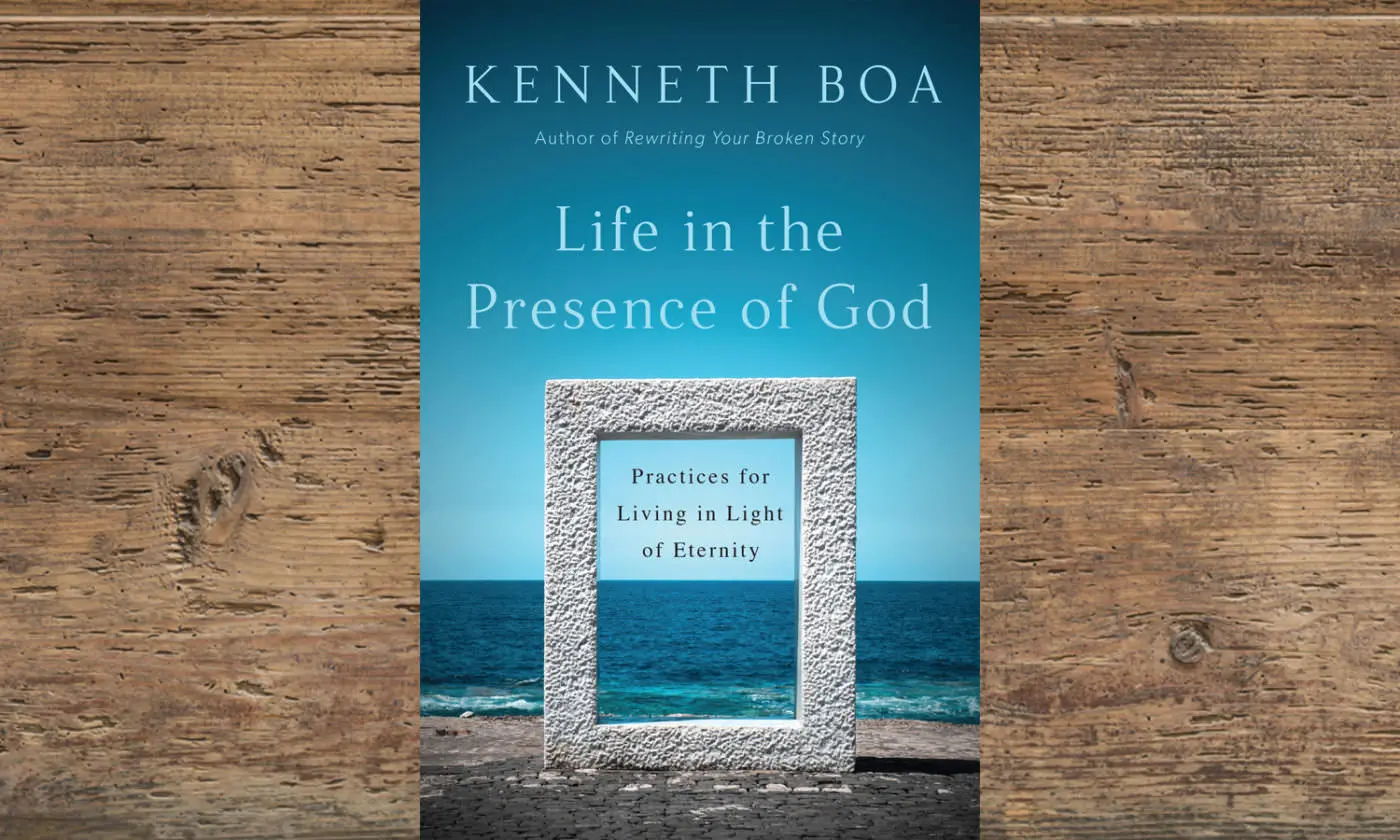The solution (and the premise of Ken’s book) is twofold.
Trusting and Training
First, we have to trust God, realizing the only way we will ever become the people he wants us to be is to live not just for Christ but in Christ. His presence and power in us allow us to live the Christian life, and we’ll fail if we try it on our own:
“Practicing God’s presence starts and ends with trust, and even the best spiritual training program in the world will fail if we don’t start here.” (p. 21)
Secondly, we must train. Ken points to 1 Timothy 4:7: “Train yourself to be godly.” Notice, Paul didn’t say, “Try really hard to be godly.” We’re to train.
Spiritual training is often seen as laborious, undesirable, and reserved for a few “super-spiritual” people. Many believers have wrong notions about training or are convinced they can’t change. Ken overthrows those misconceptions in this book. For one thing, he emphasizes that spiritual training is about more than setting aside special times for prayer or Bible reading. It’s also about growing in intimacy with Christ during the ordinary times and tasks of our day, through an endless variety of means. It’s about relationship building, not religiosity; it’s “life giving, not draining” (p. 30). Far from being boring or dull, it’s the “best thing that can happen to us” (p. 30).
But even if we see a life permeated by the presence of God as desirable, we may still feel like developing a closer relationship with God is just too difficult to attain, if not impossible. So we never start training at all, or we start but quickly fizzle. Not only is it foolish to postpone spiritual growth (which is always to our detriment), but doing so ignores the fact that growth comes in small increments. We have to start somewhere! A deeper relationship with God is “an accumulation of many small commitments to practice his presence, to live in Christ, every moment” (p. 23). People who get close to God don’t get that way by magic or default. They train, and they keep training, just like an athlete. They’re content, as Brother Lawrence was, to do “little things for the love of God,” which eventually total to something larger (p. 152). They can be found “doing practical things to get close to God—like we do with anyone we want to be close to” (p. 20).
A deeper relationship with God is “an accumulation of many small commitments to practice his presence, to live in Christ, every moment.” —Ken Boa
These practical things (which become habits with repetition) do sometimes require setting time aside specifically for the purpose of getting to know God better, but they also can happen “in a flash, in between or while we’re doing other things. They don’t need to take extra time out of our day. But they do require mindfulness and consciousness of God. These take time to develop, but they can become part of our default mode of thinking” (p. 56). Don’t believe it? Ask the scientists.
[panel style=”info” title=”Get Life in the Presence of God now!” text_align=”left”]Purchase the book in the Ken Boa Store or from any of these sites: Amazon.com, ivpress.com, Christianbook.com, Barnes & Noble, and other booksellers. E-book version available from some places.[/panel]Brain Science and Practicing God’s Presence
In one of the book’s most fascinating sections (chapter 6), Ken discusses evidence of the fact that God created us in a way that makes all this spiritual training and habit formation “imminently possible”:
“As Christians, we’re called to be always growing—drawing nearer to him and becoming more like Christ. We’re never supposed to plateau, spiritually; never to retire from growth and learning, even in old age (Psalm 92:12–14). Now, neuroscience is producing evidence that our brains are specially wired for ongoing growth. . . . It’s feasible to train our minds to be more open to God. To adapt our thinking to see the world like he sees it. And to reorganize our lives around practices that help us become more aware of his presence. . . .
“Of course, God knew all of this before the neuroscientists did. But the science helps us to know a little about how our brains work, so we understand how God uses intentional training (and repeated practice) to help us grow in godliness and awareness of his presence.” (pp. 112–113)
Read the book for the details, but to summarize, “we are eminently trainable and retrainable beings,” and our Creator, using a very real, biological yet mysterious process, “built into our brain’s anatomy this ability to ‘be transformed by the renewing of [our] mind’” (Romans 12:2). Amazing!
So it is possible to change and grow. We’re not doomed to a spiritually impoverished life. Anyone’s life can be infused with God’s presence and power—including yours, right now, if you’ll start trusting and training!
Seeing Life Clearly
As God uses our trust and our training to change us, the result is not a bunch of out-of-touch contemplatives:
“We won’t become so holy that we can’t see normal things for what they are. On the contrary; we’ll see them more clearly.” (p. 142)
What does this clear view entail?
For one, we’ll start to see the world for what it is: a temporary home we’re passing through. With this outlook, we’ll cling less tightly to the treasures of earth and invest more in things that last beyond this life—like the Word and the people he created.
We’ll see everything as integrated instead of fragmented into different realms (like work, home, and church). God is over and in all of life, not just part of it. As we “see all of life, as Martin Laird puts it, as ‘shot through with God,’ full of divinely given opportunities in whatever we’re doing” (p. 141), we’ll see that we can invite him into any and every circumstance, whether it’s dealing with a difficult customer or client, making dinner for our family, sitting in a traffic jam, or attending a worship service.
Third, we’ll begin to adopt God’s values, which are exactly inverted from the world’s values (see Luke 16:15). Gradually, the way we measure success or view the “good life” will be turned on its head as we see more through his lens and order our lives according to what’s important to him.
Finally, we’ll see that “Everything matters to God, and every moment can be devoted to him” (p. 4). He cares about every nook and cranny of our lives, and he promises to be with us in them. There’s nothing too mundane to do for his glory (see 1 Corinthians 10:31).
“We tend to think of God as caring most about the big things: who we marry, where we go to college, or our profession. But training in godliness happens at a day-to-day level, in our regular lives. All of our little decisions and routines, many of which we do without thinking, collectively shape who we are. . . . When we focus on the one decision, situation, task, or opportunity before us, rather than worrying about the next one or a whole day of them, then obeying God and living in his presence becomes less overwhelming. . . . Jesus modeled this perfectly, and we can follow his example in moment-by-moment obedience, offering ourselves up to him in small things. These little things add up . . . .” (pp. 149, 150, 251)
Seek Him While He May Be Found
When we live life in God’s presence, we’ll find our lives marked by a greater steadiness and contentment. Instead of “living with divided hearts that are constantly pulled in two directions—the world and God” (p. 251), we’ll have “united hearts” that fear his name (Psalm 86:11). Nothing around us will have changed—external pressures, stressors, and turmoil may still abound in our lives—but something inside us will have changed.
“There’s a life waiting for you, a someone you’re meant to be. You’ll find that life and identity when you seek and find God. You can’t find it anywhere else. And it really is possible, if you’ll just begin right now, right where you are, believing with Thomas Kelly: ‘God can be found. There is a last rock for your souls, a resting place of absolute peace and joy and power and radiance and security. There is a Divine Center into which your life can slip, a new and absolute orientation in God, a Center where you live with Him and out of which you see all of life, through new and radiant vision, tinged with new sorrows and pangs, new joys unspeakable and full of glory.’”[note]Thomas R. Kelly, A Testament of Devotion (New York: HarperCollins, 1992), 118.[/note] (p. 251)
Read a Q&A with Ken Boa on the motivation behind why he wrote this book. [vector_icon icon=”arrow-circle-o-right”]



